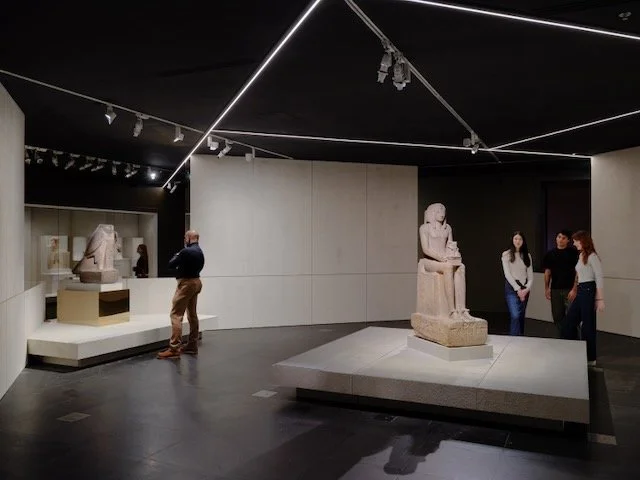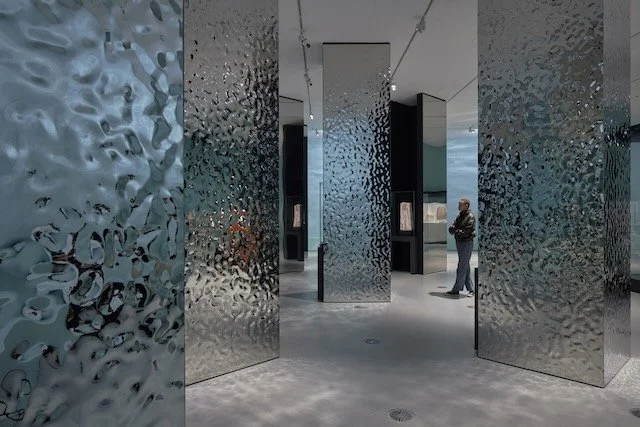The internationally exclusive blockbuster exhibition, Pharaoh, celebrates three thousand years of ancient Egyptian art and culture through more than 500 works on loan from the British Museum, including monumental sculpture, tomb and temple architecture, coffins and funerary objects, as well as a significant display of exquisite ancient Egyptian jewellery.
Installation view of the 2024 Melbourne Winter Masterpieces® Pharaoh, a collaboration between the British Museum and the NGV on display from 14 June – 6 October 2024 at NGV International, Melbourne. Photo: Sean Fennessy
Curated especially for the National Gallery of Victoria by the British Museum as part of the Victorian Government’s Melbourne Winter Masterpieces® series, Pharaoh is the largest international exhibition the British Museum has ever presented in its 270-year history. With many works on display in Australia for the very first time, this Melbourne-exclusive presentation constitutes the single largest ancient Egyptian exhibition ever mounted in this country.
Installation view of the 2024 Melbourne Winter Masterpieces® Pharaoh, a collaboration between the British Museum and the NGV, on display from 14 June– 6 October 2024 at NGV International, Melbourne. Photo: Tom Ross
Spanning from the 1st Dynasty (c.3000 BCE) to the Roman period (3rd century CE), Pharaoh explores the fascinating lives, myths and images of the successive rulers of ancient Egypt through exquisitely crafted examples of art, design and architecture. The works on display were commissioned by and celebrate some of Egypt’s most famous kings and queens, including the boy king Tutankhamun; Ramses II and Queen Nefertari; Khufu, builder of the Great Pyramid of Giza; as well as foreign leaders such as Alexander the Great.
Installation view of the 2024 Melbourne Winter Masterpieces® Pharaoh, a collaboration between the British Museum and the NGV on display from 14 June – 6 October 2024 at NGV International, Melbourne. Photo: Tom Ross.
From small sacred sculptures, to monuments of colossal scale, the pharaohs presented an idealised image of themselves as invincible warriors who defended Egypt and maintained the order of the universe. The exhibition will highlight the art and artistry of ancient Egypt and give audiences an appreciation of the artistic skill of ancient Egyptian sculptors, painters and craftspeople, whose lives were largely spent working in service of the Pharaoh.
Installation view of the 2024 Melbourne Winter Masterpieces® Pharaoh, a collaboration between the British Museum and the NGV on display from 14 June – 6 October 2024 at NGV International, Melbourne. Photo: Sean Fennessy
Outstanding examples of sculpture, statuary and art featuring the iconic image of the pharaoh include:
A superbly carved green siltstone Head of Tuthmose III, one of ancient Egypt’s most successful military pharaohs of the 18th Dynasty who expanded Egypt's empire to its greatest extent. Wearing the tall white crown of Upper Egypt and cobra headdress (uraeus) – the consummate symbol of royalty – the head presents the timeless image of the Egyptian pharaoh.
Installation view of Head of a royal statue, probably Pharaoh Thutmose III as part of the 2024 Melbourne Winter Masterpieces® Pharaoh, a collaboration between the BritishMuseum and the NGV, on display from 14 June–6 October 2024 atNGV International, Melbourne. Photo: Tom Ross
At just over 5 centimetres wide, the earliest object in the exhibition is a small ivory label depicting King Den of the 1st Dynasty, shown as a powerful ruler subduing his enemy with physical force. Even at this early period, c.3000 BCE, the pharaoh is depicted in a characteristic pose with royal regalia, an image that continued to be used by pharaohs for the next three millennia.
Installation view of Label for a pair of sandals showing King Den smiting an enemy as part of the 2024 Melbourne Winter Masterpieces® Pharaoh, a collaboration between the British Museum and the NGV, on display from 14 June–6 October 2024 at NGV International, Melbourne. Photo: Tom Ross
A larger-than-life limestone statue of Ramses II (c.1279-1213 BCE) depicts one of ancient Egypt's most famous kings as a high priest, making offerings to appease the gods in his capacity as the gods’ representative on earth. Ramses II was one of Egypt’s longest ruling pharaohs who had numerous wives, fathered more than eighty children and commissioned a vast number of temples, monuments and statuary for his own self-glorification.
Installation view of Statue of Ramses II as a high-priest as part of the 2024 Melbourne Winter Masterpieces® Pharaoh, a collaboration between the British Museum and the NGV, on display from 14 June – 6 October 2024 at NGV International, Melbourne. Photo: Tom Ross
The Seated statue of Pharaoh Sety II, c.1200-1194 BCE, a grandson of Ramses II, is the most complete sculpture of a pharaoh in the British Museum’s collection to survive from ancient Egypt, offering audiences a rare chance to experience the exceptional craftsmanship of Egyptian sculptors.
Installation view of Statue of Pharaoh Sety II (center) wearing emblems marking his royal status as part of the 2024 Melbourne Winter Masterpieces® Pharaoh, a collaboration between the British Museum and the NGV, on display from 14 June–6 October 2024 at NGV International, Melbourne. Photo: Tom Ross
Installation view of the 2024 Melbourne Winter Masterpieces® Pharaoh, a collaboration between the British Museum and the NGV, on display from 14 June–6 October 2024 at NGV International, Melbourne. Photo: Tom Ross
Installation view of the 2024 Melbourne Winter Masterpieces® Pharaoh, a collaboration between the British Museum and the NGV, on display from 14 June–6 October 2024 at NGV International, Melbourne. Photo: Sean Fennessy
Installation view of the 2024 Melbourne Winter Masterpieces® Pharaoh, a collaboration between the British Museum and the NGV, on display from 14 June–6 October 2024 at NGV International, Melbourne. Photo: Sean Fennessy
A FREE Kids installation Ancient Egypt for Kids will be inviting children to unlock the mysteries of ancient Egypt through a series of activities exploring the art and culture of this fascinating world, read more here.
Installation view of Ancient Egypt for Kids on display from 14 June – 6 October 2024 at NGV International, Melbourne. Photo: Tom Ross












